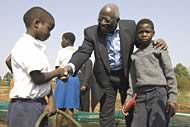 |
|||||||||
|
|||||||||||||||||||
|
|
Farmers in Swaziland to Receive Emergency Assistance 08/09/08 FAO will help cash-strapped farmers in Swaziland to purchase seeds in time for the next planting season, Director-General Jacques Diouf said today.
Diouf was speaking to reporters while visiting a school-based farming project in Boyane, near the capital, Mbabane. He said the UN agency was preparing to deliver emergency assistance to farmers under its Initiative on Soaring Food Prices (ISFP). The cost of food like rice and maize meal, fuel and other basic supplies has risen so sharply in recent months that many Swazi farmers cannot afford to buy the seeds and other agricultural inputs they need. This in turn puts them at risk of ending up without a harvest, without food, and without income. Starting 29 September, FAO will set up markets known as Input Trade Fairs where farmers will be able to choose seeds and other agricultural supplies from local producers. Instead of receiving pre-packaged quantities of seeds, the farmers will be able to use vouchers to pick and choose the varieties they prefer, while the producers will have an opportunity to meet new customers. Collaborative effort Swaziland is one of a growing list of countries around the world which are being targeted by a coordinated UN-wide effort to counteract the effects of months of increased food prices. “We are stepping up the momentum, from one country to the next,” Diouf said. “We must work together to produce more food where it is urgently needed to contain the impact of soaring prices on poor consumers,” he added. The seed vouchers have been used on other occasions to boost food production in Swaziland, most notably in the wake of severe drought-related crop losses during the 2006-2007 season. Funding for the intervention came from the European Community Humanitarian Aid Department (ECHO) and the Central Emergency Response Fund (CERF). But emergency relief from soaring prices is only one part of the answer, Diouf noted. He renewed his call for increased investment in agriculture and programmes designed to tackle problems which have contributed to the overall increase in food insecurity throughout the region. Major challenges to food security in Swaziland include climate-related difficulties and the spread of HIV and AIDS. In Boyane, AIDS orphans and other vulnerable schoolchildren showed Diouf some of the sustainable agricultural practices, handicrafts and other skills they have learned under the Junior Farmer Field and Life Schools initiative. The Junior Farmer Field and Life Schools (JFFLS) are run by FAO’s Emergency and Rehabilitation Programme in Swaziland (ECRU), in collaboration with other United Nations agencies. The JFFLS programme, funded mainly by the Government of Australia, also teaches students other technical and social skills which can help them to lead healthier, more prosperous lives. “We need to reduce the overall vulnerability of households, allowing them to maintain food security even in the face of emergencies like soaring prices and drought”, Diouf said. Initiative on Soaring Food Prices FAO’s Initiative on Soaring Food Prices includes emergency projects which are ongoing or have been planned in at least 78 countries worldwide. Food prices rose 52 percent between 2007 and 2008, resulting in severe economic, social and political consequences in poor countries. Meanwhile, high prices of agricultural inputs have become a major obstacle to developing countries' efforts to increase production. For the period January 2007 to April 2008, fertilizer prices in particular shot up at a much faster rate than food prices. Anticipating the widespread impact and grave nature of soaring food prices, in December 2007 FAO launched its Initiative on Soaring Food Prices to help vulnerable countries put in place urgent measures to boost food supplies and provide policy support to improve access to food. According to FAO, the hardest-hit countries, most of them in Africa, will need at least US$ 30 billion annually to ensure food security and revive agricultural systems that have been neglected for several decades.
|
||||||||||||||||||

|
|
||||||||||||||||||
| home | agri-services | pedigree
pen | news | dairy | beef | machinery BPS | property | organisations | site map |
|||||||||||||||||||


